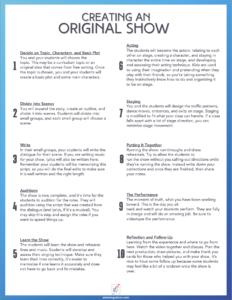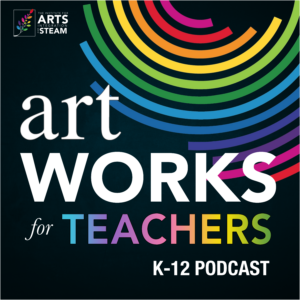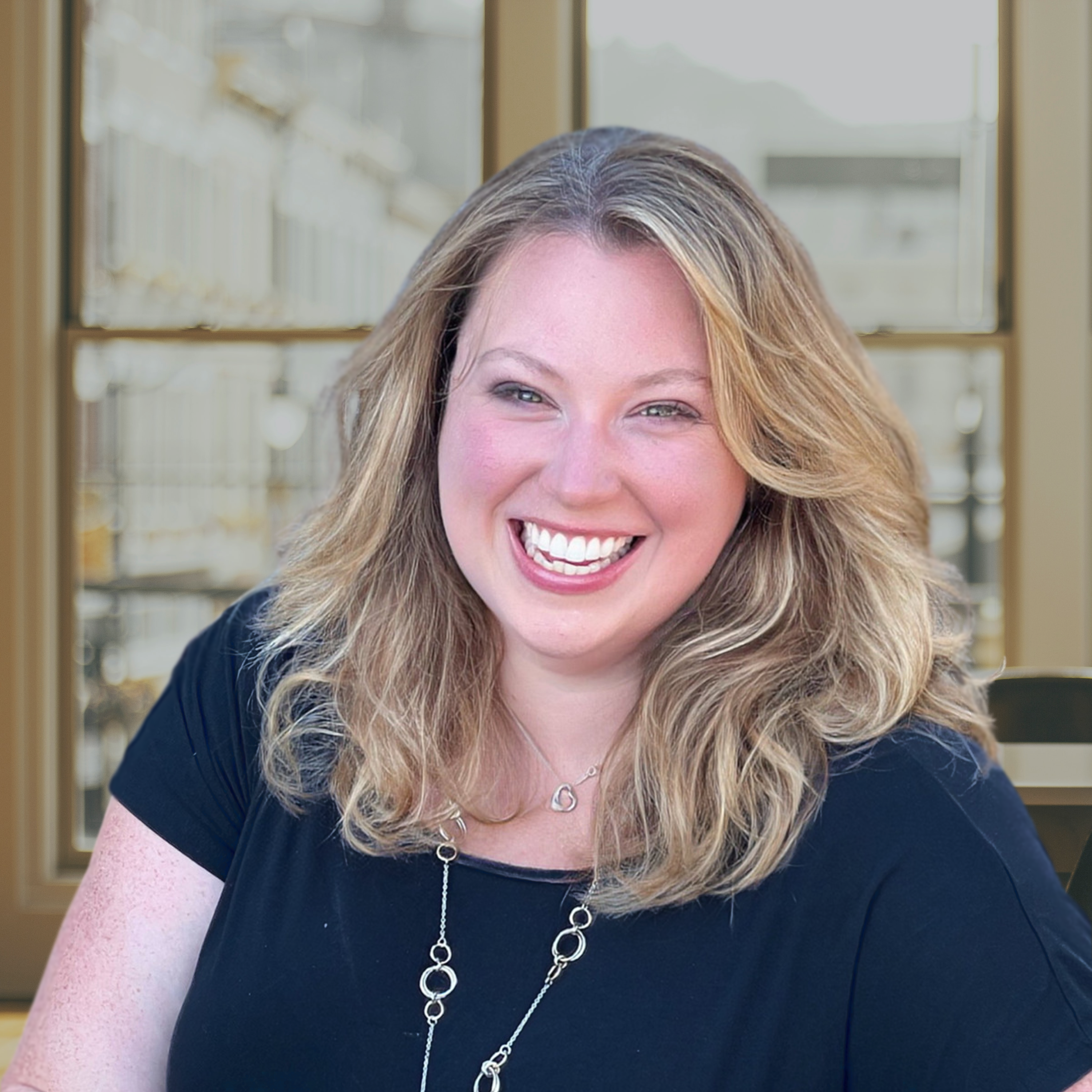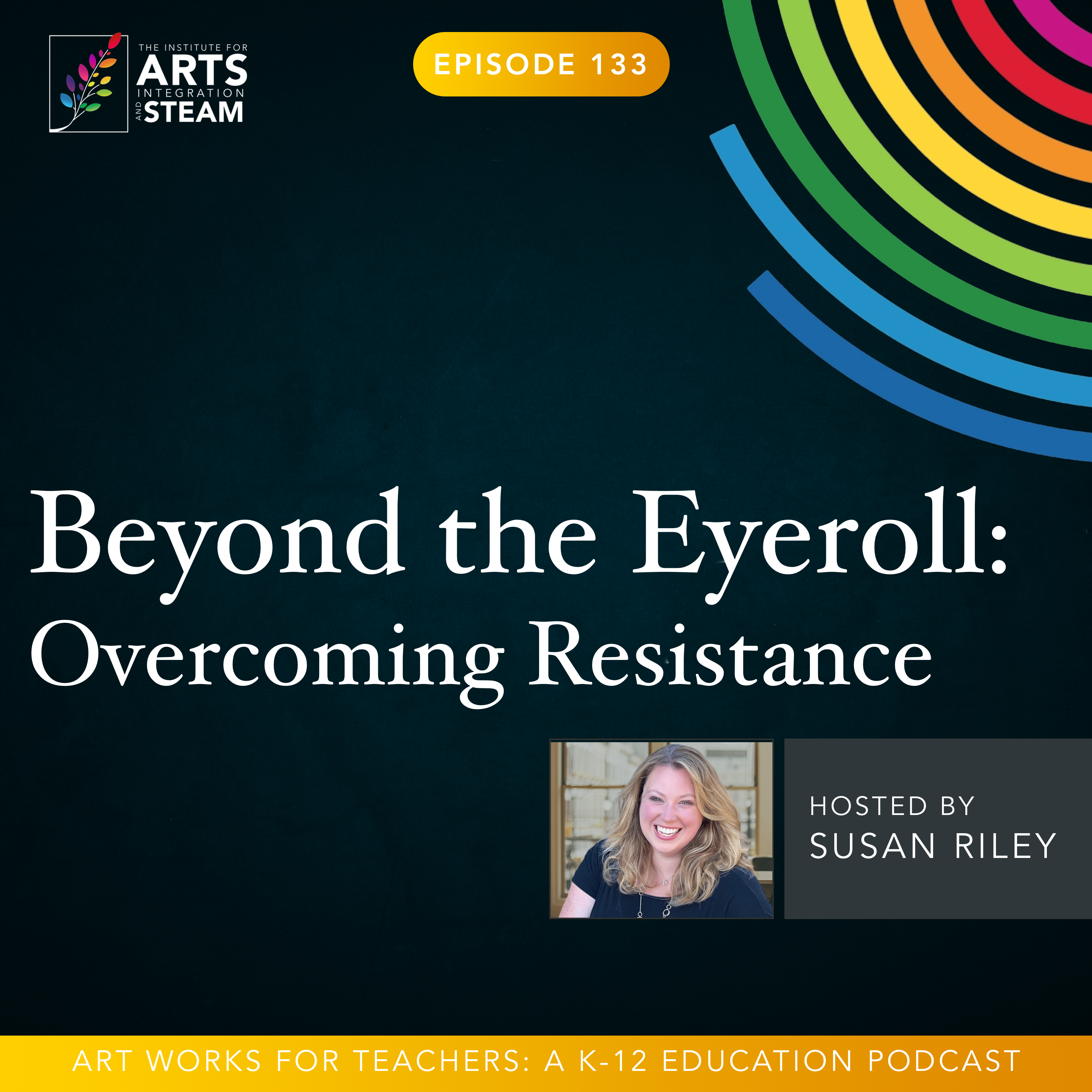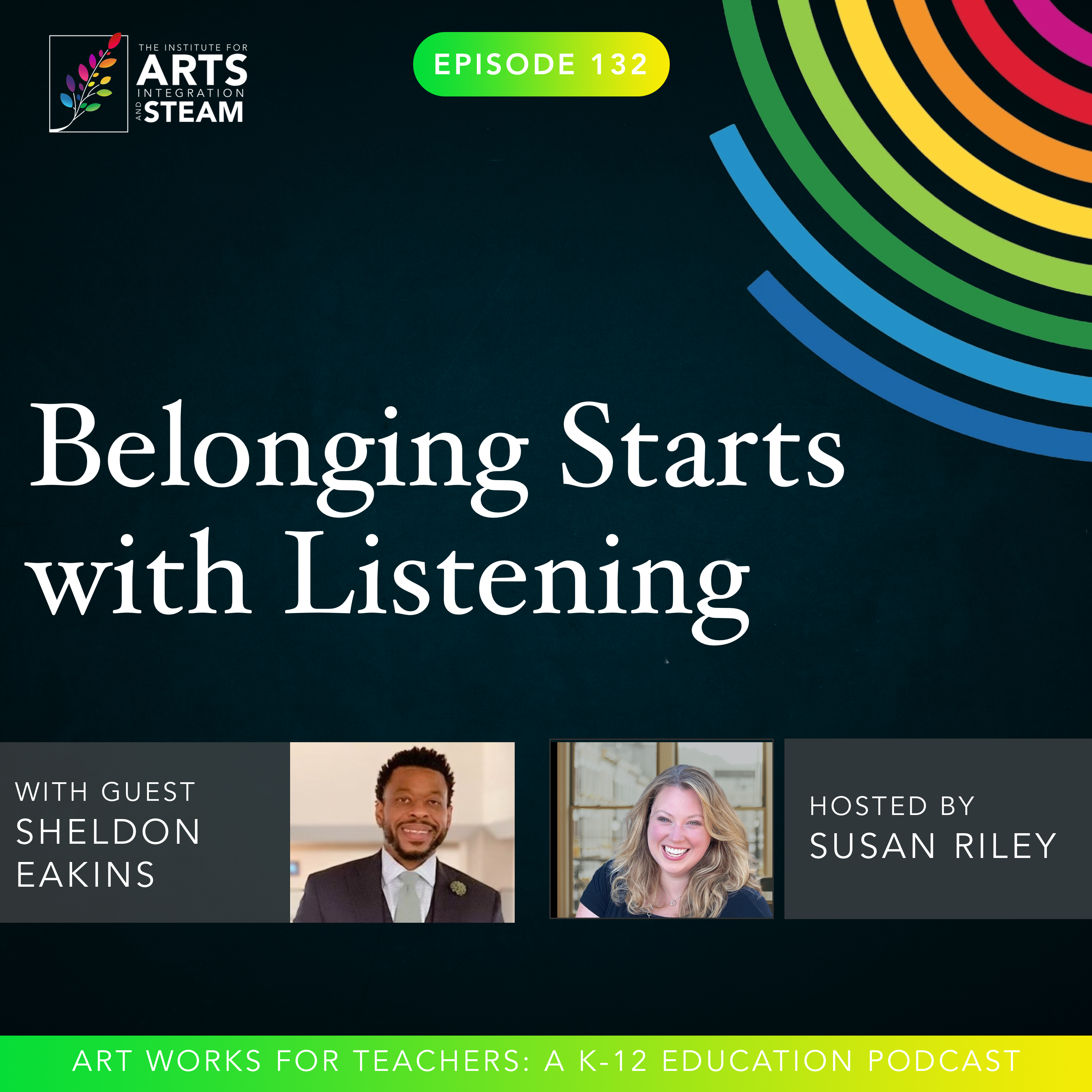ART WORKS FOR TEACHERS PODCAST | EPISODE 060 | 35:17 MIN
From the Page to the Stage: Creating an Original Show with your Students
Enjoy this free download of the 10 Steps to Creating an Original Show.
All right, well, welcome Ann. Thank you so much for joining me today.
Ann
Thank you, I’m just happy to be here.
Susan
Well, for those who may not know you or your work, could you please introduce yourself? Tell us a little bit about you, your background, and your work to date.
Ann
All right, so I am actually a trained opera singer, and that’s where I got my degree from in vocal performance, and I studied acting and dance and all of that fun stuff. It was so fun going to college, and I hit the ground running. Even when I was still in school, I was working. And so I started touring locally, just doing runouts, weekend, things like that, performing as a soloist, and also performing a lot of children’s theater, which is what became my love. So then I had a career and still do, I still sing, but I had a really long 25 year period of doing local regional opera, like with Los Angeles Opera and other comparable opera companies, as well as touring nationally in all over the US and in Asia. And in between those tours, I had my company and still do Southland Sings and was doing writing shows, commissioning shows, performing, doing all sorts of things, and really jumped into children’s theater because kids are the best audience because they’ll tell you if they like it or if they don’t like it. And they’re very honest. So I appreciated knowing truly what my audience thought because it made me a better performer and then continuing to sing. So that’s kind of who I am and what I do.
Susan
And that’s amazing. So yeah, that’s great. So I love your opera background cause that’s also in my wheelhouse as well. I went to Westminster Choir College and started, I was always a music major, but at that college, everybody’s, you’re trained to sing. And so we often worked with various opera singers and it’s such a wonderful medium that I don’t think it’s enough credit, nor do I. And I love that you have a career in that because I think people assume that opera as a medium is long ago. And I have many friends who are currently singing in operas around the world and they will tell you, oh no, we make a living doing this. So that’s amazing, yeah.
Ann
Yeah. And the training of opera, if you can adjust the style, then you can, if you have a, it’s like ballet. If you have a good technique, then you can jump into the other forms of dance. It’s like with opera, then you can jump into the other forms of singing as long as you can master the style. So you don’t want to sing, oh, it’s like an opera singer, you know, it’s not gonna work. But yeah, but you’ve got the technique. You’ll have a good sound for most of your career.
Susan
Yes. Absolutely. Absolutely. So I know that in your work in children’s theater and that passion area for you, you talked a little bit about how children are such a wonderful honest audience, but how has your opera training really influenced how you work with children and what you produce for children?
Ann
I think the opera training really comes in with singing and working with the kids with their voice and teaching them, a lot of times kids who are singers and they’re really singing out. So I work with kids who don’t have any music and kids who have careers. So I kind of have the whole range. And so specifically with the kids who are more career minded, they tend to oftentimes hammer on the voice and sing a little bit to over sing for their age.
And so I definitely, when I’m working with kids like that, I just give them some techniques on how to back off and not push it so much, and just sing with the voice that they have and build on that voice and to not try to sound older because there’s plenty of girls who sang Annie when they were younger and fried their voice out. So I’m trying to keep them from doing that.
Susan
Yes. Right, exactly. Yes, keeping that healthy sound for our children.
Ann
And then, exactly, and then the other aspect of opera that has helped with what I do, because now my stuff is more musical theater oriented and theater as well, just straight theater with that, with music in the background that’s not necessarily vocal. I find that just the whole presentation and the acting and the projection of the speaking voice, all of the training in opera has really helped that too.
Susan
Absolutely, which kind of leads me into my next question because you’ve written this awesome book for specifically for elementary classroom teachers called From the Page to the Stage that is for people who are looking to infuse more of that drama or even musical theater aspect into their classrooms. So how did you come up with the idea for that book?
Ann
Thank you. I had been doing this program, it’s morphed, so I’ve been doing children’s theater and then in classroom workshops for about 25 years, maybe a little longer, I’m so old. Anyway, I started when I was…
Susan
No, no, you’re just in the prime of life. That’s what we call the stitch.
Ann
It started when I was 12. Anyway, there we go. So about 25 years and I started with the shows and kept running those and then developed a songwriting workshop that was a shorter term workshop and it was with Los Angeles Unified. It’s like one of the biggest school districts in the country and they had a special program that I could apply for and very few arts companies got into it and we were one of the first, the founding members. So we had a lot of cash and I think I did 50 residencies just of the workshops, not me personally but I had other teachers too. And so we really got our feet wet teaching kids how to write music and developing it there. And then it just grew from there. And then eventually we expanded from doing just regular school classrooms which could be general ed or special ed within the public school, we went to other campuses like Braille and got to stage a bunch of kids at Braille and having, how do you stage kids who are visually impaired or completely blind? How do you work that out? And so problem solving there. Then we went into the prison system for youth, or I should say, yeah, the juvenile justice system working with a myriad of kids. So with all that background, from that came the book, all the experience of working variety of kids from general ed to drug rehab to psychiatric care to foster care to homeless youth all of it in between just that information and I and I the book came out of that saying I want teachers to know what I do and what’s working so incredibly well with these students.
Susan
Okay, so I’m gonna piggyback on this a little bit because we just had a guest on about a month ago. Her name is Isis Clay, who also worked with youth in the prison system and specifically works in drama skills and process drama with those students. And so I’m curious in your experience, not just with that population, but with the variety of population that you’ve outlined here. Why or what was so significant about using drama and music with these students?
Ann
It brings them to life.
I had a girl who I’m working with, I’m in Texas right now, I go back and forth between Texas and California. And I’m working with a school where the kids are taken out of public school and it’s kind of their last chance. And these are kids that will throw chairs and yell at you and run out and storm out of the classroom. So when I came in, this girl didn’t wanna talk to me, wouldn’t look me in the eye and was yelling every obscenity and orbiting around the classroom disrupting. And then she got kind of used to me. I came in about maybe four sessions and each time she got less and less disrupted, but she would not look me in the eye. She would not answer a question. She wanted me out of the room. She could not stand having me in there. So I wasn’t gonna leave. And I have a classroom teacher overseeing, so I can afford to not pay attention to her because we’ve got someone else managing her. So I’m working with the other students who are fine and they’re engaged and they’re working.
And she got, I think a little interested in what we were doing. And so what she did was she sat over about four feet away, turned on some music on her Chromebook and started singing. And so I didn’t look at her, I ignored it. I thought, you know, I’m just gonna let it go and just let her do whatever she wants as long as she’s not a harm to sell for others. Let’s keep going. And at the end of the session, I said to the class, and this is maybe a class of just five students, because these are very specialized sessions and that kind of thing, I said, who was singing? Who was that? It sounded so good. And she, for the first time, answered one of my questions and looked me in the eyes and said, it was me. And I said, you have a beautiful voice. And she said, really? And I said, yes. Now, I happen to be a singer. If you want me to give you some tips, I’d love to do that, but only if you want me to.” She said, yeah. I said, okay, we’ll do it next time. She goes, can I give you a hug?
So that’s why I do it. Because now, granted, you’re not gonna have this situation all the time. It’s an extreme example. But if I wanna say, why does music and drama help with your general ed classroom? You can have a kid who’s falling behind who really needs motivation. And they can, or you have students who have hidden talents, they never knew they could do, and all of a sudden they discover it in here.
You have kids who are having trouble getting into the shoes of characters that they’re studying, historical figures. Maybe you’re gonna do a show about the historical figure. It can help get them in the shoes and develop empathy. The list goes on and on, building confidence, projection, working together and collaborating. It lights the brain up in so many ways. So it’s one way to bring engagement to the kids.
And also motivation to say, oh, hey, I know we’re gonna be working on our show. I better show up to school. I better complete all my tasks. When I have kids that get roles, I also require if they’re kids that are struggling with homework, I require that they turn their homework in order to keep their role. So I also attach other motivators to that. So there’s millions of reasons. I hope I answered your question. I feel like I’m lost.
Susan
You did, you did. It reminds me that the arts are such a powerful way for everyone, but particularly our students, to feel seen, to feel truly seen, and to be able to express themselves and to be heard. And you’ve offered such a wonderful opportunity for them to do that in what you’ve outlined in your book. So give people a better understanding what your book is about and why or how this works.
Ann
So basically the book just outlines in steps how to create an original show. And it goes from creating the topic and the character. And I did make a little notes because oftentimes I do this so much, I kind of forget which number is which step. So I do have to refer down to that just because it’s so rote for me, it’s so automatic. I don’t necessarily think of it in steps anymore. But I did put it in steps because I just think it’s easier to outline and to remember. And so…
I basically have them brainstorm and pick out a topic. Now that’s where you can do a curriculum concept or you can just do a free writing exercise. Either way, you’re touching literacy components, right? And if you’re also doing something, say historical social studies or something like that. I had kids in one class, it was more of an advanced class, a gifted class. They had this chapter on early man. It was the caveman.
And it was kind of boring and the kids were having trouble. So I said, let’s write a musical about that. And it was the best musical because they had one solo where the guys trying to figure out fire and they’re figuring all these different names and finally come up with fire. And then they go into a heavy metal song about fire. Or in the beginning, the guys are singing early men, early men, we’re the early men. And the girls come in and go, what about the girls?
It should be early people and it doesn’t fit syllabically so it messes up the song. Anyway, so they just they got really super creative with it and took all of the concepts that were in there but made it so much more interesting than the actual story. So we find that outline it, divide it into scenes, then I break them into small groups. And so if they’re a group of eight, then I divide into eight scenes and we have the groups choose which scene they want to take and then they write a lyrics and they write connecting dialogue. And so they also have to connect with their neighboring scenes as they put the dialogue together. And so by that point, I think that’s the first three steps is where they actually write it. It takes me about five 45 minute sessions to get the show completely written. And then after that, we have step four, which is audition. And if you’re depending on your class,
If you need to just select, because you know who’s gonna do well, great. If you have a class where everybody, you know, anybody could do it who wants to, you know, let them self-select or audition. If you have several people wanting to do a role, then you have them audition with lines from the show and just, and you decide who’s read it the best, and also who can memorize it the best and that type of thing. Then step five is just gives you some tips on how to teach them the show, how they can learn the show, learn it correctly.
You know, always you want to develop good habits. You don’t have to undo anything if they learn it right. That goes with music too, same thing. I had to really work on that as an artist when I first started out. So I had to undo a lot of bad habits. Then we go to the acting. Now these aren’t necessarily, some of these go together. So like they’re learning the show, you can also be working on the acting. So the, and I do make a point of that in the book saying these particular steps they all kind of work together and they build on, like a spiral staircase. So, and that’s the learning, right? So you do your base and then you kind of come back and relearn, not relearn, but learn more about those same things and build on that. And that’s really what this book is like, spiral staircase, going up, and building until you get to the top. So acting is step six, although again, you would probably use that with learning the show. Staging is one safe, got a good handle on the show, then doing the traffic patterns, motivations as to why they’re moving around. Some pitfalls that happen with people who are directing and may not have a lot of experience. Also at that point, learning to see what the kids are offering, because the more they can self-direct if it’s good, and it gets better usually, then that takes the work off of you a little more.
And so what I imagine is it’s very teacher heavy in the beginning, running it. And then once the kids get going and they figure out what’s going on, the teacher does a little less work and then the kids begin to do more. And then you in a way switch places by the end where the kids are doing everything and you’re having your mocha frappuccino sitting in the office. That’s my goal. It happens most of the time. I’m gonna say that. So it can be done. It’s a beautiful thing.
Step eight is putting it together, run throughs, just how you kind of work that through. Costume ideas, I keep it very simple. I usually bring in, after Halloween, I’ll usually go buy Halloween fabric on sale, make capes, things like that. Early man, I bought a bunch of leopard material and they made kind of togas with belts and headbands. And we had the kids do that part. They designed their, so I just gave them a bolt of, said, do your magic.
And then finally step, not finally, but step nine is a performance. And it just kind of gives you ideas of how to do this performance. And the step 10 is just the reflection. What are ideas that you can do after? Because I gotta say, especially when I first started as a performer, I always felt kind of down when the show was done, because it was such a big deal. And some of the kids feel a little like, little let down when it’s over. And I…
I feel like some kind of follow through, go back and talk about it. Talk about maybe eventually you could write a sequel or maybe the kids write a story that’s a sequel. Just whatever it is to somehow continue it. Maybe draw pictures, put together an animation if any of the teachers know how to do that. There’s a lot of, there’s quite a bit of good software out there that you can do that.
Um, or put together a picture book, maybe photographs of them. And then you can go and have it put into a book, that kind of thing. Something that carries it on, uh, also what they learned, those type of things. Um, it reflection can be really simple. It can be complicated. And then can I add one more thing with regards to the book? So this book is geared towards teachers who don’t really have a degree in music or theater. It’s really for people who haven’t done this before.
If you’re a seasoned performer and you’re also happen to be a school teacher, I think this book would be too rudimentary for you. It just wouldn’t be that interesting. Uh, however, if you were teaching a fellow teacher, this, this book would be really good to give to them. Um, or if you’re a teacher who just really needs ideas, the other thing that’s kind of cool about that, the book, if I do say so myself is during the steps. That, um, like in the writing of the show, I offer a simple option in the beginning. And it may just be, if you are crunched for time, you are so stressed out, but you have to do some kind of show, then I get an existing script and maybe modify the ending a little bit, or shorten it if you wanna do a shorter show, or just do a short thing in the classroom is just something to try it out. So simple option can take you very little time. Then if you wanna be more advanced, I have the other ideas.
The thing about this process, and I do this with Simple Option Advanced on quite a few of the steps wherever it’s appropriate. The biggest thing to remember is if you’re going to do this, just do it where it’s realistic, and don’t stress yourself out because this will engage your kids and they will learn a lot of the stuff you’re teaching them about communication, collaborating, compromising, right? Working together.
It’s really important and if they develop more collaborative skills, then when you go to do other projects with collaboration, it’s just going to be a little easier.
Susan
Yeah, and I’m so glad that you brought that up because that’s the very first thing that most teachers are going to say is that I don’t have time to do this. But I think about all of the skills that are embedded with what you’re talking about. So how many speaking and listening skills are being covered? How many, when you’re looking at writing, the idea of composition and sequencing and looking at main idea and detail and looking at finding evidence to support a viewpoint, even if it’s having, as you said, and I love that you provide the scaffolding, that if it’s, if they’re crunched for time to just do a small portion of it, and then being able to have students be as part of the audience, as well as perhaps putting on the show so that, because being an audience is also about listening skills and being able to kind of dissect a play and understand it better and perhaps provide a reflection on that.
I think there’s so much that is, that we naturally have to teach, but rather than separate it out into all of these small little lessons, you could combine them and put them together into a show, big, small, or otherwise, right? Because we’re allowing our students to then practice those skills, is that right?
Ann
And yes, and empathy, they’re developing empathy and that’s hard to teach. And it’s a natural, it’s a byproduct of developing acting skills. So, and here.
Susan
Absolutely. Well, and I also think we don’t ever teach students how to be an audience. I used to talk about that all the time with my music classes. We’re going to teach the rest of the school how to be a good audience. What that means, what they need to do to stay engaged, you know what I mean? And I think that pertains to that. Yes!
Ann
Oh, I know what we mean. We would start shows with, let’s talk about how we’re different than watching TV. Yeah. Like you can’t turn to your friend and go, this is really fun, really loud. Although we appreciate the compliment. We can hear you. You know. So an example of simple, I just want to show. So you’re reading, this could be done like in five minutes in your class.
Susan
Yes, exactly, exactly.
Ann
You’re reading a little section the kids are zoning out a little bit But maybe it is a historical thing or whatever say oh, hey Can we does anyone want to volunteer to get up and pretend to be this character? Let’s write a couple lines and say you know and then all of a sudden just from that you can organically create a play My my some of my students were actually one of my other teachers they were doing the what’s it called with all those? Sciencey there you go. I’m very I’m not scientific. I Use the word sciencey. It’s not a word. I know um
the elements, the periodic table, sorry. They did a show about the periodic table and the ones, those components that were not compatible, they argued all the time. You know, and the ones that got together, that worked well together, or the ones that were explosive, you know, so when they combined certain characters, certain things happened, it was super creative and they really nailed it. So anyway.
That can all just be done in your classroom. You don’t have to put this in front of the school. You can just do it in your classroom and have the kids share out. And then if they like it enough, talk to one of your other teachers saying, hey, can we come into your class? Or can your kids come into our class? And can you watch a little bit of our show or in the auditorium if you don’t have the room? So like I said, small scale or super large. It’s meant to do exactly what I do.
When I walk in, if I have kids throwing furniture around the room and yelling, God knows what, I’m not gonna have them put on a musical in front of everyone. I’m gonna modify my program like crazy. And that’s what this book does. It gives you every idea.
Susan
Yeah, yeah. And I think it’s so practical. It’s engaging, it’s helpful to people. You’ve laid it out in such a wonderful way that I feel like it’s accessible to anyone. I have done original shows for years and I got so much value out of your book, even having done it myself. So I think that…
Congrats to you for being able to kind of showcase how to do this in a way that almost anyone could do it with Students and to have such an impact. I do have another question about The process that you share because I think this is important One of the things that really came across to me in the book is that you encourage students to take so much ownership Of this process. Why is that so important?
Ann
It’s theirs, if it’s yours, you care. It’s yours to be a great success or failure. If it’s on you, 100%, you’re gonna work a lot harder to succeed and you’re proud. You’re proud of what you’ve done and you wanna tell everyone. And I tell the kids when we first start, you’re gonna write a show, you’re gonna perform in it, you’re gonna be memorized everything, you’re gonna write everything. And you’re gonna perform it in front of your family and your friends and they’re like freaking out. And I said, and you’re gonna love it. You’re gonna love it. And they do, they do. And I’ve had kids show up like my teachers, one of my teachers is having lunch out in LA somewhere. And this, you know, a kid comes up to him from like two years ago and says, that was the coolest thing we did, and then start singing the songs from the show.
Susan
Of course, right? It just hides in their brains forever. Have you ever had a flop? Have you ever had a show flop?
Ann
Yeah, I’ve had shows that are better than others. I tend to adjust. I think that’s where, and I tie like this in the book because I don’t really have failures, but I have had situations where I said, hey, this group is a little too volatile to perform in front of a live audience. Let’s scale it down and have one classroom come in and watch them. Or I’ve had, and I’ll give an example, like I was a special ed class.
I overshot on that one. I gave them too much dialogue to, they wrote it, but I should have edited more of it out. And I realized about halfway through, they weren’t memorizing our lines. So all I did was just modify the script. And instead of the king having to remember to say, I’m very hungry, I would say, the king’s stomach was growling and he was, oh, so hungry. And then he might touch his stomach and he might say, I’m hungry. It doesn’t matter. And I’m working with a school for kids with autism.
right now, it’s a private school. And there’s, it’s a boy band, it’s a story about a boy band and this agent, quote unquote agent, who’s actually a bad guy, agree, he says he wants to represent him, but he’s taking all the money for himself and he keeps telling him, oh, I’ll give you money tomorrow, tomorrow. And finally he says, oh, my dogs are really sick, I have to pay the vet, so everybody’s upset, you know. So they say, sure. And then one day they catch him at the mall shopping he’s buying all this really nice stuff, and so they bust him. Anyway, so it’s kind of a cute, very simple story, but these guys are lower learners, and so already with them, I’m weaving their lines into the script, and I prompt them through the script. And then Cody was very angry. Cody, how angry were you? And then he’ll go, I’m very angry. So I’ll ask them questions through the narration. So that one originally was a script for them to memorize, but I had to morph it into something get prompted a lot or And then also you can go the other way to don’t over prompt. I think that’s a big thing So it’s just knowing Just just feeling it out. So no, I haven’t had a flop but I have definitely overshot and Had to really adjust as I go
Susan
Yeah, but what I think is interesting about everything that you shared is that even if something doesn’t go quite the way you planned or what other people might say that was not, that was a failure, that part was a failure, you’re able to pivot and that you’re able to pivot in real time and so failure isn’t really an option. It’s just an opportunity to turn, right?
Ann
Oh. And yeah, and I’ve had instances where I really felt like the kids aren’t quite ready. So I would tell the audience and the kids and the teacher, I’ll say, this is how we’re gonna approach it. We’re gonna call it an open dress rehearsal. And I’m gonna explain the process of the dress rehearsal. And even if some of the parents are there, I’m gonna say, so this is our, they have created this show and we wanna show you part of this process. So our show is gonna be a little different. This isn’t a script that they were handed and had to learn, they had to write it first, then they had to design what they’re gonna do on stage. So we’re really far along. This to us is our open dress rehearsal that you’re gonna help us with. So if somebody maybe forgets a line, I may stop the show and remind them and help them along and then cheer them on. And you know what? Usually I don’t have to do it, but if I do, then the audience clapping. And then I may say after that scene, I’ll say, what was the difference? What did you notice when I stopped? And I said, hey, try this.
How was it compared to the first time they did it? What did you like better? And then the audience will give them feedback and then it will become a constructive feedback type of session. So again, like I said, it’s whatever you want it to be.
Susan
So wonderful, so wonderful. Well, and where can people get their hands on the book and stay in touch with you?
Ann
So amazon.com, I’m on Amazon. So if you search from the page to the stage, you’ll get it. Or under my name, Ann, A-N-N, Noriel, N-O-R-I-E-L. And then I can be reached, you can look up my website, which is southlandsings.org, www.southlandsings.org. Or I mean, can I give my email? Is that okay?
Susan
Of course you can, yeah.
Ann
Perfect. My email is acnoriel, N-O-R-I-E-L at mac.com, like Apple Macintosh, M-A-C, and it’s A, it’s an Apple C as in cat, acnoriel at mac.com. Yeah, email me. I would love to hear from you.
Susan
Perfect. Yeah, absolutely. We will put all of that in the show notes and it was a joy to talk with you today. Thank you so much for being here and also for writing this book so that we can get more arts in the hands of kids and teachers everywhere.
Ann
Well, thank you. It was my pleasure.
Ann’s contact information: acnoriel@mac.com, 626-235-2596
Ann’s book: From the Page to the Stage
Ann’s website: www.southlandsings.org
Ms. Noriel is President and Co-founder of Southland Sings, where the ten-step process was created. Southland Sings uses the arts to unlock creative potential in every student they reach.

